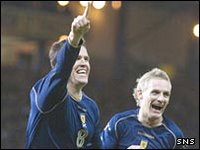Lessons for Ireland in the Flowering of Scotland

As if it wasn't a bad enough time to be a follower of the Republic of Ireland football team. Around the same time as Paddy Kenny was conceding his ninth goal in two international matches, Scotland were celebrating possibly the finest result in their long, and varied, international history.
Only a few years ago, as Ireland were qualifying for the 2002 World Cup and Scotland were mired deep in tormented soul-searching about the state of their national game, the good fortune of one was often used as a stick to beat the other. Now, it seems, in the shape of Walter Smith's stewardship, that the Scots have firmly taken that cudgel from our grasp and are whipping our already raw posteriors with glee.
The form of the international teams of the two nations became an instrument of comparitive study for football academics because of their respective similarities. In any field the contrasting of the development of two ostensibly similar environments is a basic scientific discipline: give one twin sweets for a month, give the other lettuce, see what happens - hey presto, a Phd.!
As Ireland enjoyed what now appears to be the twilight days of our approximately 15 year period as a serious football nation, the Scots - the nation of the Lisbon Lions, Bremner, Law, Baxter, Dalglish, Souness; that back in the early days of the game had invented the idea of passing and running, known as 'the combination game', which was soon picked up to replace the brutish style that had been prevalent in England - appeared to have stopped rearing footballers at all, rather becoming a conveyor belt producer of managers and coaches.
While the likes of Ferguson, Moyes, Strachan and Souness were managing Premiership clubs, accompanied by scores of compatriot assistant managers, coaches and lower league bosses, the playing crop was barren. The diminishing in status and quality of the domestic league was one thing, but the Scots were not even producing young players to be cherry-picked by England's top clubs anymore.
Where once every club in the English top flight had a contingent of Scots - busted-nosed centre-halves, jinking wingers, rip-roaring centre-forwards, whatever - now they were outnumbered in Premiership dressing rooms by Scandinavians.
How on earth is it, the Scots cried, that the Irish, a nation of a roughly similar population, with an even weaker domestic league and in which football was not even the national sport, how is it that they are making World Cups, bringing through young players at the top level, achieving success in underage tournaments, and we, the nation of the Lisbon Lions, Bremner, Law etc., etc., are an international embarassment?
For Stephen Staunton, read Berti Vogts. Not an obvious parallel, given that the German had won a World Cup as a player and a European Championship as a manager, and the Louthman had a moderately successful playing career and, erm, a spell coaching at Walsall behind him. But Vogts presided, like Staunton is now, over a period in which both the playing stocks, and the reserves of confidence and experience within those players, were at an all-time low. Vogts had it worse, in fact, given that Ireland's squad still boasts many Premiership regulars, where the German capped largely from the English second tier and the non-Old Firm domestic clubs.
The other parallel is that, despite an apparent advantage in terms of their relative grasps of the English language, Staunton's public statements are often as confusing and ill-advised as Vogts' infamously were. Where Staunton, for example, stated in a press conference last week that the Germany and Cyprus matches were similar in that Ireland were expected to win in both, Vogts declared, as his team lurched through their opening qualifying matches for the last World Cup, "I will be with my team in Germany in 2006 on the pitch - not in the stands with a hot dog and Coca-Cola."
However, while the Vogts reign was characterised by what Craig Burley, after his only cap under the German, described as a "a clear misunderstanding of the way we are going.....the players simply don’t understand what’s being asked of them," (an analysis which would resonate with anyone watching Ireland on Saturday) the players that have taken Scotland to the pinnacle of their group almost all served their international apprenticeship under Vogts.
While the German was accused of "handing out caps like sweeties" by his erstwhile assistant, and now Walter Smith's, Tommy Burns, the players that were unearthed during his management and that were not subsequently discarded now, by virtue of the harsh lessons and humiliating moments of their early international careers, have proved experienced and capable enough at this level to grind out results like that on Saturday and the similarly chiselled out victory against Lithuania in the previous qualifier match.
The circumstances of Vogts' acceptance of the Scotland job, characterised by the retirement of a number of old pros and the passing of the end of a cycle of players who had taken Scotland to several tournaments in the 1990s, appear very similar to those of Staunton's. And while Vogts was a figure of jest and derision like Staunton is quickly becoming, any shortcomings in their decisions and actions as managers were, and are, matched by the transitional and wholly deficient quality of the squads they worked with.
So it remains a useful comparison, that between the fortunes of Ireland and Scotland. And although the Scots now have the upper hand in that comparison, the lessons for Ireland in it are pleasing. If, in a few years time, the humilated players from last Saturday in Nicosia are rebuilding our footballing reputation like their once cowed Scottish counterparts are now doing, then Stephen Staunton, although very unlikely to be still managing them, will have achieved something.






0 Comments:
Post a Comment
<< Home